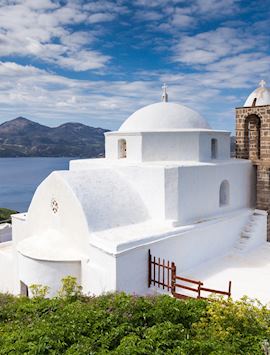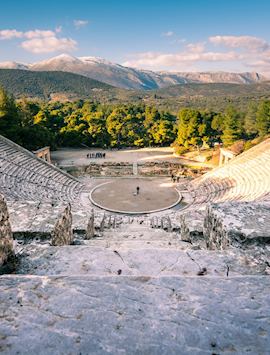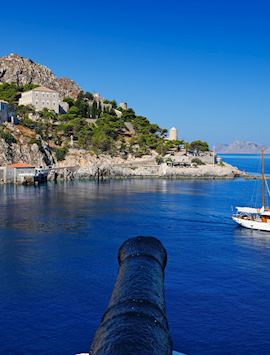Comprising the mainland, Peloponnese Peninsula, and thousands of islands sprinkled throughout the Aegean and Ionian Seas, Greece has its fair share of turquoise waters and sun-soaked shores. However, it also offers a diverse inland landscape filled with mountains, lakes, vineyards, caves, canyons, and volcanoes — as well as ancient ruins at every turn.
From the lesser-visited Peloponnese with its medieval walled towns, unspoilt beaches, and archaeological sites, to the cities of Athens and Thessaloniki where relics rub shoulders with street art, and the Cycladic islands featuring whitewashed villages that tumble down to azure bays, choosing where to visit in Greece is the hardest part.
Our specialists can curate a Greek odyssey that speaks to your passions. You might hike the forested slopes of Mount Olympus, go truffle hunting in Thessaly, trek an active volcano on Milos, or make cheese with a farmer in Crete.
Wherever you choose to visit, we’ll introduce you to places that sit quietly under the radar, and connect you with local guides to get you closer to the real Greece.
Choose your destination
1. Athens

Why visit: ancient ruins, street art & exceptional food
Many people come to Athens for its ancient history, but this bustling metropolis is also home to a vibrant arts scene with graffitied backstreets and gallery-lined squares.
For a deep dive into classical Greece, we recommend a private tour of the Acropolis and its crowning glory, the Parthenon. Your guide will lead you through 2,500 years of history — and to hilltop views that are the best in the city. Go at dusk when the setting sun turns the marble golden. Then, wander down to the Plaka district to explore the steep cobblestone streets and open-air cafés and bars.
For a modern take on Athens, a guided tour of the city’s street art will unlock the meaning behind eye-catching murals created by some of Europe’s leading street artists — and give you a chance to explore less-visited districts like the gritty streets of Gazi and Psirri.
Dig deeper: See the city through local eyes on a walking food tour of markets, delis, bakeries, and Bougainvillea-draped tavernas. Along the way, you’ll sample traditional dishes, from kerbside souvlaki to loukoumades (honey-soaked doughnuts) washed down with a glass of retsina.
Don’t miss: Make like an Athenian and take a high-speed ferry trip over to nearby Hydra, a car-free island and artists’ colony. Beyond the main town with its boutiques, cliffside galleries, and restaurants, you’ll find tiny villages and little windmills, a scattering of monasteries, and several beaches, which you can reach by water taxi.
Get me there: Highlights of Ancient Greece
2. Thessaloniki
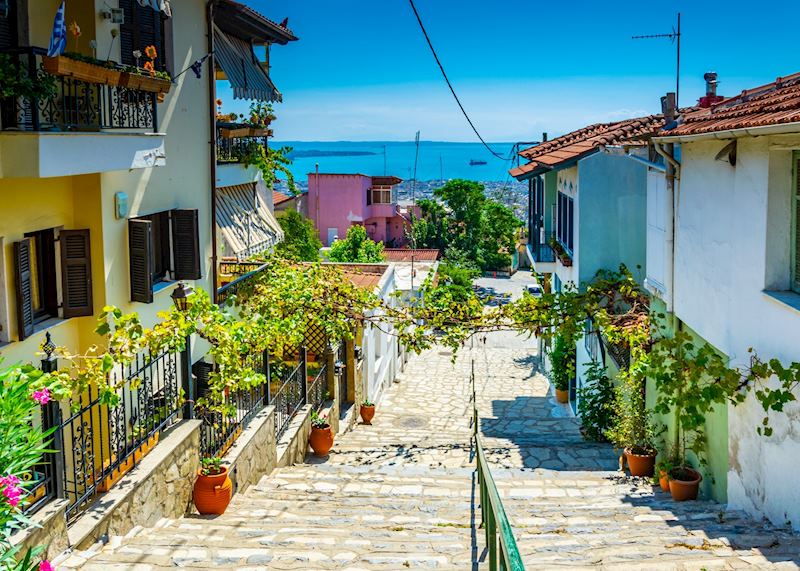
Why visit: Royal tombs, Jewish heritage & mythical mountains
Athens might have the Acropolis, but Greece’s second city Thessaloniki is no less rich in history with 15 UNESCO-listed sites, many within strolling distance of each other, and plenty more museums.
There are a variety of ways you can unpack the past. You might follow in the footsteps of Alexander the Great with guided visits to excavated site Pella, where he was born, and the ancient city of Vergina. Here, you’ll discover the marble tomb of Philip II, who was buried with silver chalices, a gold shield, and countless other treasures.
Or, delve into Thessaloniki’s evolution and architecture with a private walking tour of the city. Your guide will lead you through a maze of narrow cobblestone alleys, past Byzantine fountains and Ottoman-style houses brought to life with vibrant street art. You’ll discover the remains of a Roman forum, spy vibrant frescoes in the Rotunda, and from Trigonion Tower, enjoy views of the city hugging the sea and Mount Olympus in the distance.
Dig deeper: Thessaloniki has a rich Jewish heritage, best learned about on a guided tour. From admiring the city’s only surviving pre-WWII synagogue to visiting an Ottoman-era Jewish hammam and exploring the Museum of Jewish Heritage, you’ll discover how Jewish presence for 2,000 years has shaped the city.
Don’t miss: Once believed to be the home of Zeus, Greece’s highest mountain, Mount Olympus, features thick forested slopes ribbed with trails to hike. We can arrange for a guide to lead you along the Enipeas Gorge to cascading waterfalls and a monastery whose chapel is carved directly into the rock.
Get me there: Mainland Greece Tour
3. Meteora
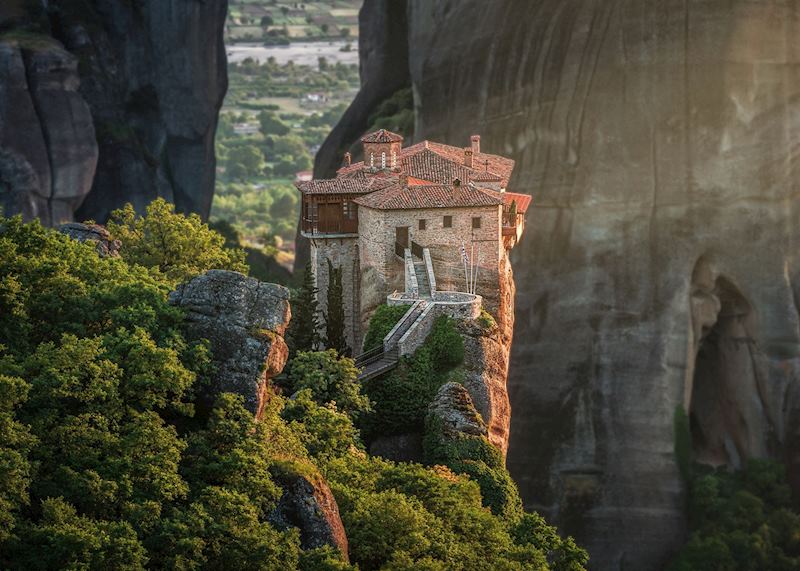
4. Nafplio
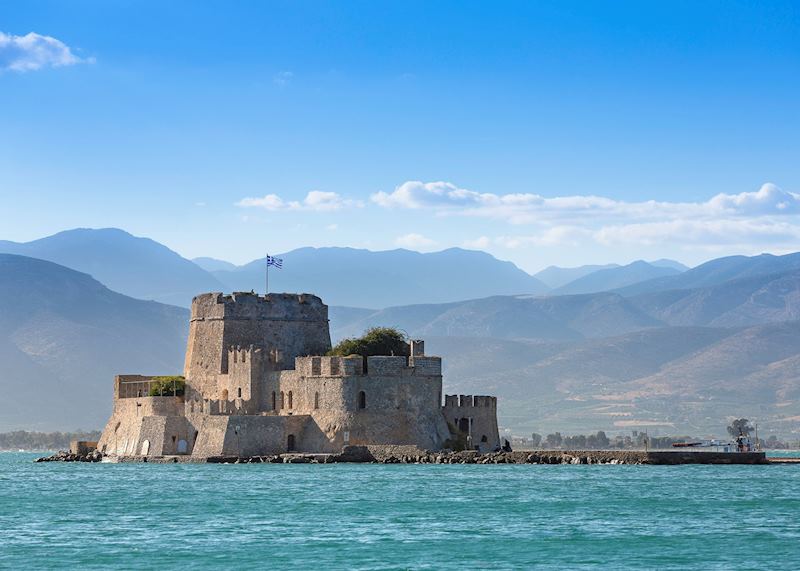
Why visit: Venetian architecture, sunken ruins & exceptional food
With its seaside location, Venetian architecture, and proximity to Athens, Nafplio in the Peloponnese is a popular weekend retreat for Athenians.
We can pair you with a private guide to explore Nafplio’s history on a walking food tour. As you wind your way down from Palamidi Fortress to the Old Town, strolling narrow cobblestone streets past Ottoman fountains and neoclassical mansions, you’ll discover how the city was shaped by occupation. Along the way, you’ll pause at chic cafés and family-run stores to taste local cheeses, ice-cream, and chilled ouzo.
Nafplio is also a great base for exploring some of Greece’s most significant ancient sites. You can visit the ruins of Epidavros, where your guide will explain the powerful acoustics behind the well-preserved amphitheater, or join a kayaking trip to a nearby sunken city.
With an expert guide, you’ll paddle the coastline, stopping at tucked-away coves, before snorkeling above the easily visible remains of a Roman villa.
Dig deeper: Within easy reach of Nafplio, the Nemea wine region is one of the oldest in Greece, and we can arrange a private tour of two of its wineries. At Skouras, you’ll explore the cellars before sampling the estate’s award-winning fruity red made from its signature blend of cabernet and local agiorgitiko.
Don’t miss: One of the oldest ruins you’ll likely see in Greece, the site of Mycenae was the first Bronze Age settlement on mainland Europe. With a local guide, you’ll discover the intact Mycenaean beehive tombs that, pre-Pantheon, were the largest unsupported domes in the world, and the monumental Lion Gate.
Get me there: Athens & Nafplio
5. Corfu
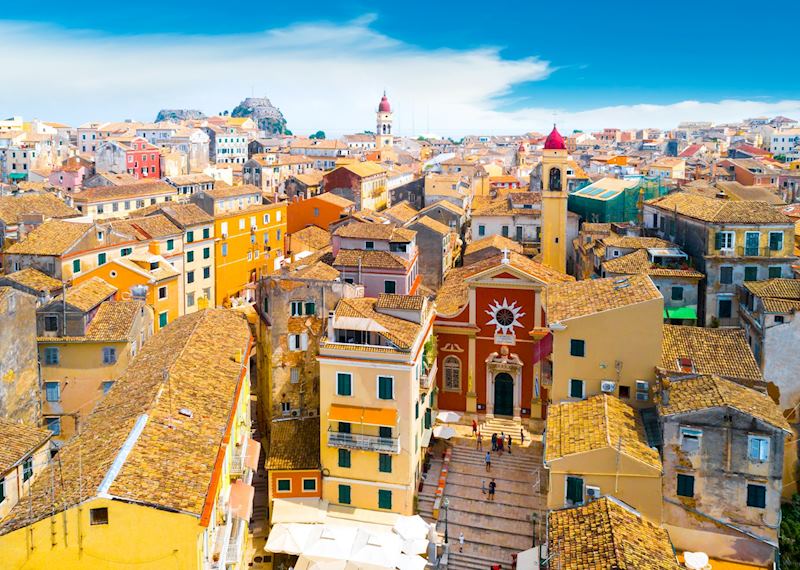
Why visit: Corfiot cookery, hidden caves & hill hiking
An island in the Ionian Sea, Corfu is a charming clash of Venetian, British, and French influences — and nowhere is this more visible than in the UNESCO-listed Old Town with its hidden squares and grand mansions.
A private tour of the town will introduce you to the legends and traditions behind sites like Saint Spyridon Church with its red-domed bell tower, and the Byzantine-era Old Fortress high on a hill, whose bay and sea views make the climb worthwhile. Or, you can soak up the town’s atmosphere on a food tour that leads you through winding, narrow streets to tiny cafés and delis for tastings of local delicacies like pastitsada (veal or rooster cooked in a spicy sauce).
For a taste of Corfu beyond the town, we can arrange a trip to the countryside, where pastel villages meet rolling olive groves. You might delve into the history of olive cultivation at a 15th-century mill, or cook local dishes on a wood-fired oven with a Corfiot chef.
Dig deeper: Surrounded by pine-pinned mountains, Corfu is one of the greenest islands in Greece, and a guided hike will get you closer to its tapestry of landscapes. You’ll stroll the coastline on trails alive with wildflowers to Rovinia cave, and then to the island’s largest olive grove just as the sun sinks into the Aegean.
Don’t miss: Smaller Ionian islands sit close to Corfu, and you can explore their coastlines on a private boat trip. The voyage will take you to the white sands and turquoise waters of Antipaxos to swim and snorkel, then on to the many hidden caves that dot the western coast of Paxos.
Get me there: Mainland Greece & Corfu
6. Crete
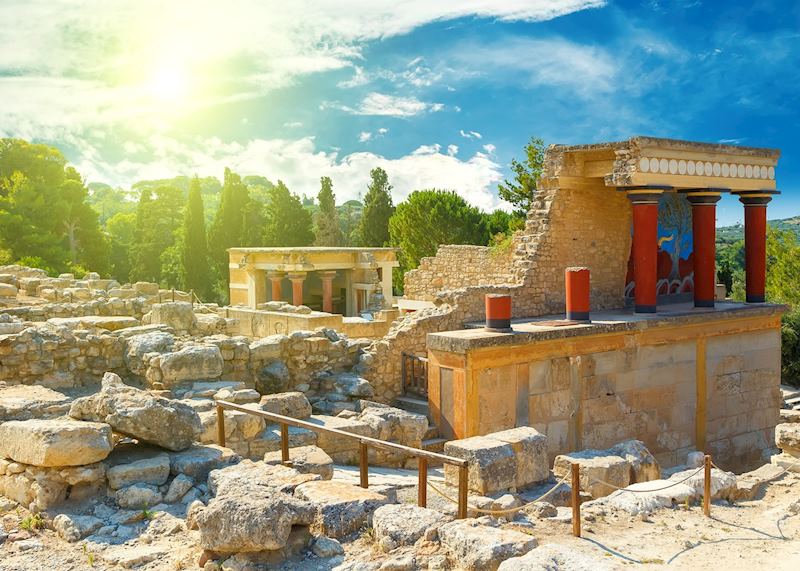
Why visit: Minoan culture, sandy beaches & olive oil tasting
With its archaeological sites, mountain trails, sandy beaches, and vineyards, Greece’s largest (and most storied) island rivals global cities.
Crete is best known for its Minoan culture, and you can learn about these influences on a private tour of the Palace of Knossos. The hilltop complex comes with more than 4,000 years of history, 1,300 rooms, terracotta pottery, frescoes, and panoramic sea views. Combine this with a tour of Heraklion’s archaeological museum, which has an impressive Minoan artifact collection.
For a more hands-on experience, we recommend a guided trek to the mountain village of Mochos, where you can paint ceramics in Minoan style.
The island is also known for its wine, and we can arrange a behind-the-scenes tour of a winery and olive oil producer. Alongside teachings and tastings, you’ll visit the world’s oldest olive tree (Vouves), whose branches are used to curate the wreaths awarded to marathon winners at the Olympic Games.
Dig deeper: For a taste of Crete, you can sample bougatsa, a custard-filled pastry, on a guided food tour of seaside town and food hotspot Chania. Or, visit an 18th-century olive mill where you’ll help to prepare traditional dishes using herbs foraged from the mountains.
Don’t miss: Sitting just off the coast of Crete, Spinalonga has a long and varied history, by turns a 16th-century Venetian fortress and leper colony. A private boat tour will introduce you to the uninhabited islet’s ruined buildings, rocky shores, hidden coves, and deserted beaches.
Get me there: Discover Crete
7. Mykonos

Why visit: Historic windmills, art galleries & local cheese tasting
More than just nightlife, Mykonos is home to art galleries, archaeological sites, old monasteries, and sprawling, sandy beaches.
You can learn about the Cycladic island’s history and culture with a food tour of Mykonos Town. Your private guide will you lead you through a warren of narrow alleys to Panagia Paraportiani, a complex of Renaissance-era churches built on top of each other. Then, it’s on to the waterside terraces of Little Venice for the best views of the island’s windmills.
Along the way, you’ll stop for tastings. You might try louza, a Mykonian prosciutto, or sample sticky, flaky melopita (honey pie) from a 400-year-old bakery.
Alternatively, we can arrange for you to make conversation and cheese with a local farmer in a traditional village. You’ll learn the age-old traditions and techniques in crafting a tangy kopanisti or creamy xinotyro, before getting hands-on with preparing cheese-inspired dishes.
Dig deeper: Whitewashed and thatched, seven windmills sit atop a hill overlooking Mykonos Town and the sea. Built to grind flour in the 16th century, this clutch of mills is a great place to catch the sunrise or sunset. While there, pop into Boni Windmill, now an agricultural museum.
Don’t miss: Just a 30-minute ferry ride away, the tiny “sacred” island of Delos is one of the most important archaeological sites in Greece. A private guide can breathe life into the 3,000-year-old ruins before leading you in the footsteps of Apollo to the summit of Mount Kynthos for sweeping views of the Cyclades.
Get me there: Romantic Italy & Greece
8. Santorini
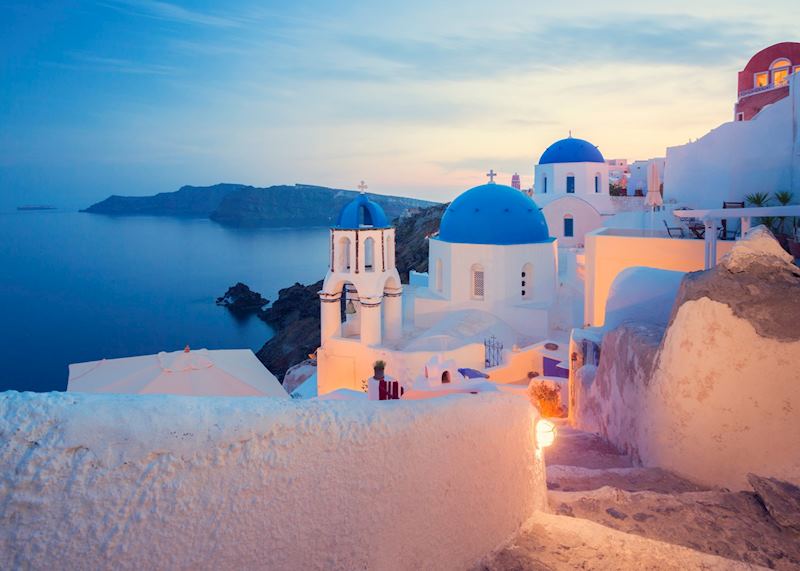
Why visit: Sunset vistas, hot springs & award-winning wine
Vivid sunsets, white homes that teeter on cliffsides, and a flooded caldera created by a volcanic eruption 3,600 years ago… Santorini’s vista has turned it into one of the world’s most distinguishable destinations.
To best appreciate the island esthetics, we can arrange a private guided hike from Fira to Oia, a centuries-old town with historic windmills and a high-flung castle overlooking the Mediterranean Sea. You’ll be rewarded with sweeping views of the ocean, speckled with Greek islands, and the sun’s final descent over the flooded caldera’s black rim.
Or, you could take in views of the volcanic crater from a vineyard on a guided tour of the Venetsanos winery. You’ll learn about the production methods, tour the cellars, and sample Santorini’s most distinctive white grape variety, assyrtiko, on the terrace as you watch the sun descend over the Aegean, throwing its warm hues across the caldera.
Dig deeper: To see the caldera and coastline from an alternative perspective, we can arrange a private catamaran cruise. Here, you can swim and snorkel, then simmer away in volcanic hot springs where the warm sulfur-rich waters are believed to smooth the skin.
Don’t miss: The ancient city of Akrotiri is a great introduction to what life was like in Santorini’s advanced Bronze Age settlement. A private guide can help unpack the narrative behind the excavated remains, from intricate frescoes to pottery, and lead you to the lighthouse on a high cliff edge above the sea for panoramic sunset vistas.
Get me there: Luxury Greek Honeymoon
9. Milos
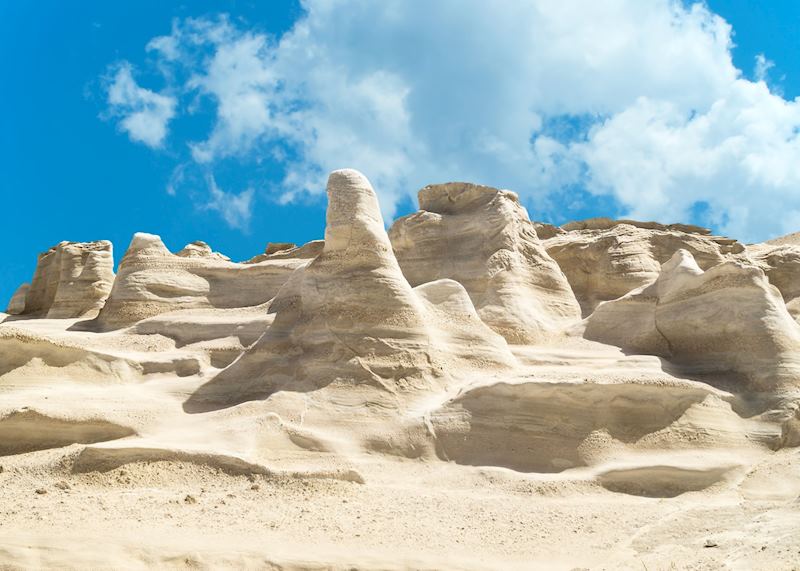
Why visit: Rock formations, hidden caves & lunar-like beaches
Imagine a beach on the moon. With its smooth, bone-white volcanic rocks, shaped over time by lapping salt water, Sarakiniko Beach is typical of the unusual landscape on Milos.
Mined since Neolithic times, this lesser-visited Cyclade is sprinkled not just with out-of-the-ordinary beaches, but multi-hued rock formations, hot springs, and hidden caves, best explored on a hike of the northern coast.
With a private guide, you’ll pass fishing coves, stroll sandy beaches, peek into red-rust caves, and trek through low brush to Sarakiniko Beach, where you can snorkel over the wreck of an algae-covered ship.
If you want to delve deeper, we can pair you with a geologist who’ll unpack the island’s history through its lunar-like landscape. You’ll visit port towns, explore abandoned sulfur mines, and trek across an inactive volcano to spot steam that continues to stream through cracks in the ground 90,000 years on from eruption.
Dig deeper: Beyond the great outdoors, you can learn more about the island through its food. We can connect you with the chef of a Milos taverna for a cookery lesson, where you’ll pluck fresh produce from gardens, learn Greek culinary techniques, and get hands-on with an array of local meze dishes.
Don’t miss: Sometimes referred to as ‘Little Venice’, the hillside port of Klima is lined with brightly hued syrmata, tiny houses carved out of the rocks by the sea, which were originally used by fishermen who moored their boats below. From here, you’ll enjoy panoramic views of the island.
Get me there: Athens & the Greek Islands tour
10. Naxos

Why visit: Farming villages, secluded coves & Naxian cuisine
The largest of the Cyclades, but quieter than its better-known sisters, Naxos is also the greenest. Its lush landscape is dotted with small farming villages that have largely disappeared elsewhere in the archipelago.
To fully appreciate this fertile interior, we’ll arrange a private hiking tour through the mountainous landscape of Tragea Valley. You’ll discover the whitewashed town of Halki with its narrow alleys, vine-shaded squares, and art galleries, and the tiny hamlet of Moni, where you can visit a Byzantine church whose 7th-century frescoes are still visible.
Thanks to its nutrient-rich lands, Naxos is ripe with local produce, and you can get hands-on with these in a cooking class. At a family home in the village of Kaloxilos, you’ll learn all about Naxian ingredients, from potatoes to honey, before rustling up traditional dishes. You could also visit a distillery to sample Kitron, the local citron liqueur, paired with galaktoboureko, a sweet custard pie.
Dig deeper: Once a stronghold for the Venetians and later the Byzantines, the island’s history is written in the architecture of the town, and you can discover this on a private tour. You’ll see Venetian mansions still standing in the Kastro area and visit the historic marble village of Apiranthos with panoramic views of surrounding mountains.
Don’t miss: Beyond Naxos, you can sail among nearby small Cyclades on a catamaran trip. Cruising the coastlines of Ano Koufonisi and Irakleia, you’ll spot dolphins, visit near-empty beaches, and snorkel in secluded coves.
Get me there: Cycladic Islands
11. Paros

Why visit: Marble churches, crystalline beaches & wine tasting
Paros is known for its snow-white marble, and archaeologists estimate that 80% of all Greek antiquities were sculpted from marble slabs sourced here. You’ll see evidence of this in the island’s 13th-century Venetian castle and on a guided tour of Ekatontapiliani, the Church of 100 Doors. The 4th-century church features an intricate marble exterior adorned with carvings and mosaics, and marble pillars from a Grecian temple to Aphrodite are visible through a glass floor.
Beyond ancient ruins, pine-studded Paros is also home to whitewashed cubist villages and some of the longest crystalline beaches in Greece. Just a short ferry ride away, twin island Antiparos offers yet more beaches, and a dramatic cave lined with stalactites. We recommend a guided tour on foot and by boat to take in the castle ruins, vibrant market, and coastline of smaller islet Despotiko, where you’ll glimpse the ruined temples to Artemis and Apollo.
Dig deeper: For a closer look at life on Paros, we can arrange for you to visit the island’s oldest winery. An expert will lead you on a tour of the cellars and vineyards before guiding you through a private tasting of five wines paired with Cycladic cheeses.
Don’t miss: The tiny port town of Naousa offers a labyrinth of narrow lanes blooming with bright-pink bougainvillea, a picturesque quay, and a Venetian castle overlooking the town below. We can arrange a guided tour that also takes in Lefkes, a hillside village in the rugged interior.
Get me there: Cycladic Islands
12. Delphi

Why visit: Myths, forests & beekeeping
Just two hours from Athens, in central Greece, Delphi is considered the most important ancient site after the Acropolis. Legend has it that Zeus released two eagles from either side of the Earth, and they met in Delphi. This, together with the Oracle, made it a popular pilgrimage place for ancient Greeks.
As scenic as it is sacred, the sprawling UNESCO-listed Delphi site sits high on the slopes of Mount Parnassus overlooking mountains and olive groves — and is best explored on a private tour.
A guide can lead you to the site’s most significant ruins, from statues to temples, and unpack the stories behind the Sanctuary of Apollo where the Oracle prophesised, the monuments built by pilgrims who visited, and the stadium and theater where the Pythian Games were held.
You’ll also tour the archaeological museum, which houses artifacts including the Sphinx of Naxos and golden treasures discovered beneath the Sacred Way.
Dig deeper: Just a 40-minute drive from Delphi, the fishing town of Galaxidi was once home to Greece’s most important shipping families. Here, you can wander the town’s cobbled streets lined with painted houses and Neoclassical mansions, sample fresh seafood in a waterfront restaurant, or visit a local beekeeper in nearby Itea for a lesson on making honey.
Don’t miss: Set on the southern slope of Mount Parnassos, and surrounded by fir, spruce and juniper forests, the mountain ski resort town of Arachova has a particularly scenic setting with panoramic views at every turn. Wander the narrow, cobbled streets in search of local crafts like woven rugs and wooden artworks.
Get me there: Highlights of Ancient Greece
Read more about trips to Greece
Start thinking about your experience. These itineraries are simply suggestions for how you could enjoy some of the same experiences as our specialists. They're just for inspiration, because your trip will be created around your particular tastes.
View All Tours in Greece
